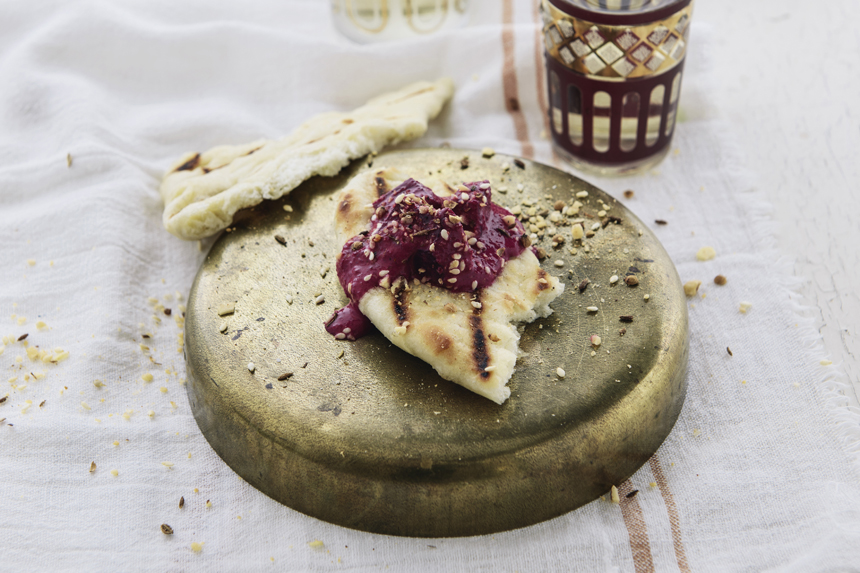Roasted Beet Dip
(Makes three cups, 12 servings)
4 medium red beets (about 1 pound total), trimmed
1 tablespoon olive oil
1 garlic clove
1 ½ cups plain Greek yogurt
¼ cup extra-virgin olive oil
1 tablespoon fresh lemon juice
½ cup dukkah (recipe below)
4 pita breads
Preheat oven to 400°F.
In 8-inch square baking dish, toss beets with olive oil to coat, and season with salt and pepper. Add ¼ cup water and cover pan tightly with foil. Roast for about 45 minutes, or until beets are tender. Allow beets to cool for 10 minutes.
Using paper towels, rub beets to remove skins (skins will slip right off). Cut enough of beets into about ¼-inch dice to measure 1 cup; reserve trimmings. Set diced beets aside. Quarter remaining beets and combine in a food processor with beet trimmings and garlic and process until finely chopped. Add yogurt, olive oil, and lemon juice and blend to a smooth puree. Season with salt and pepper. Transfer mixture to a medium bowl and fold in diced beets.
To serve, transfer beet dip to a serving bowl and sprinkle dukkah evenly over it. Serve flatbreads and remaining dukkah alongside for dipping.
Make-Ahead: The beet dip can be made up to 2 days ahead, covered, and refrigerated.
Per serving:
Calories: 77
Total Fat: 2.5 g
Saturated Fat: 0.5 g
Sodium: 82 mg
Carbohydrate: 9 g
Fiber: 1 g
Protein: 5 g
Diabetic Exchanges: 0.25 starch, 0.5 vegetable, 0.25 fat
Dukkah
(Makes 1 ½ cups)
Dukkah is an Egyptian spice blend loaded with a unique combination of coarsely ground toasted seeds and nuts. For a simple snack, dip a piece of pita bread or grilled flatbread into extra-virgin olive oil, or your favorite dip, and then dunk it into dukkah. Sprinkle dukkah on deviled eggs or over a green salad, and use it as a crust for fish, chicken, or lamb chops.
½ cup hazelnuts
¼ cup sliced almonds
⅓ cup coriander seeds
⅓ cup white sesame seeds
2 tablespoons cumin seeds
1 teaspoon fennel seeds
½ teaspoon kosher salt
¼ teaspoon freshly ground black pepper
¼ teaspoon cayenne pepper
Preheat oven to 400°F. Spread hazelnuts and almonds on separate small baking pans and toast in oven until fragrant and golden, stirring occasionally, about 6 minutes for almonds and 8 minutes for hazelnuts.
Rub warm hazelnuts in a cloth to remove brown skins. Cool hazelnuts and almonds completely.
Heat small heavy sauté pan over medium heat. Add coriander seeds and stir for about 3 minutes, or until aromatic and toasted. Transfer to small plate and set aside. Add sesame seeds, cumin seeds and fennel seeds to pan and stir over medium heat for about 3 minutes, or until toasted and aromatic. Transfer to plate and cool completely.
In food processor, pulse coriander seeds four times to break them up. Add hazelnuts, almonds, sesame seeds, cumin seeds, and fennel seeds and pulse until coarsely ground. Do not blend to paste; mixture should be texture of coarse bread crumbs.
Transfer to a bowl and stir in salt, black pepper, and cayenne.
Make-Ahead: The dukkah will keep for up to 1 week, stored airtight at room temperature.
From Good Food, Good Life by Curtis Stone. Copyright © 2015 by Curtis Stone, excerpted with permission of Ballantine Books, a division of Random House LLC. All rights reserved.
Become a Saturday Evening Post member and enjoy unlimited access. Subscribe now



